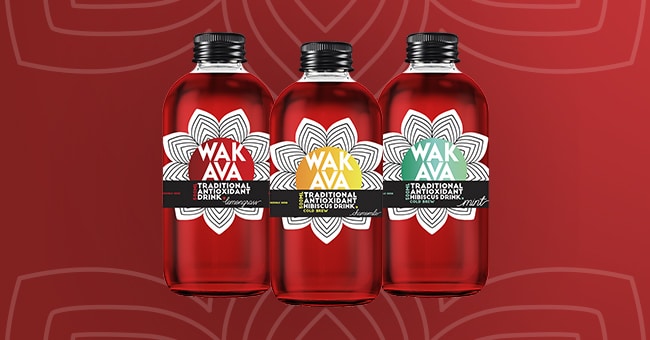While hibiscus has become an increasingly popular ingredient across beverage categories from kombucha to beer, cold brew hibiscus tea brand Wakava is offering a flavor less familiar to American consumers. Founded by Nigerian entrepreneur Olamide Adeboye, the St. Louis, Missouri-based brand aims to introduce new flavors to the American palate by offering a twist on a popular West African antioxidant beverage.
Adeboye developed the concept for Wakava three years ago, when he emigrated to the U.S. from Nigeria. Upon arriving, Adeboye said he noticed his “system changed” with the different diet he had to adopt, and sought out an antioxidant beverage to support his immune system. At the grocery store, pomegranate juice brand POM Wonderful sparked his interest.
“I couldn’t find the kind of beverage I wanted. I saw this beverage called POM Wonderful, and I thought ‘I can do something more unique and more innovative,’” he said.
Knowing that he “just wanted to create something,” and despite lacking any background in the beverage industry or experience with consumer products, Adeboye said he largely had to teach himself how to launch a beverage. Through Square One, a training program offered by St. Louis’ Center for Emerging Technologies designed to provide support to early-stage and first-time business owners, Adeboye was able to get feedback from other entrepreneurs in the program. He tried out several iterations of the tea until the beverage didn’t taste “like anything they’ve ever tasted before, which is what I wanted,” he said.
“When I got that, then I knew I’d gotten the product,” he said.
The beverage (which Adeboye said means “let’s share good things”) is inspired by zobo, a popular Nigerian beverage made with dried hibiscus leaves. The product is cold brewed for 26 hours to make the hibiscus less acidic than zobo to “match the American palate.” Adeboye said Wakava differs from other hibiscus-flavored products on the market as he’s noticed the ingredient is often used in very small quantities and thus does not have the deep red color or strong flavor that Wakava offers.
The product launched in February 2019 in three flavors which also feature functional benefits — Mint (Glow), Chamomile (Calm) and Lemongrass (Immunity), sold for $5.99 per 500 ml bottle. All flavors also feature ingredients such as ginger, cloves, lime, star anise and raw cane sugar.
The brand sources its hibiscus crop from female farmers in West Africa, while other ingredients come from local urban farmers in the St. Louis area. Adeboye said he aims to use Wakava to help raise awareness about diversifying ingredient sources in a sustainable way, particularly highlighting the many crops Africa has to offer. Due to COVID-19, he said the prices for its ingredient sources and materials have increased dramatically, though like other entrepreneurs and local specialty stores owners he’s spoken to in St. Louis, he said he aims to “keep on going to keep it alive.”
Wakava, which is entirely self-funded, conducts most of its business through ecommerce, though it is available in a handful of local specialty and international food stores. In terms of marketing, Adeboye said the brand relies heavily on local farmers markets (which have reopened in the area with social distancing precautions in place) along with social media to increase brand awareness. The brand will also be rolling out a new website which will enable wholesalers to more easily connect to the brand, Adeboye said, along with new labels to emphasize the product’s functional benefits.
Adeboye said he ultimately aims to make Wakava a lifestyle brand, with plans to expand its beverage offerings and also move into food. With these new launches, which include an herb-infused cold brew coffee and probiotic beverages along with better-for-you pasta and rice, his main priority will continue to be using West African crops to introduce new flavors to American consumers.
